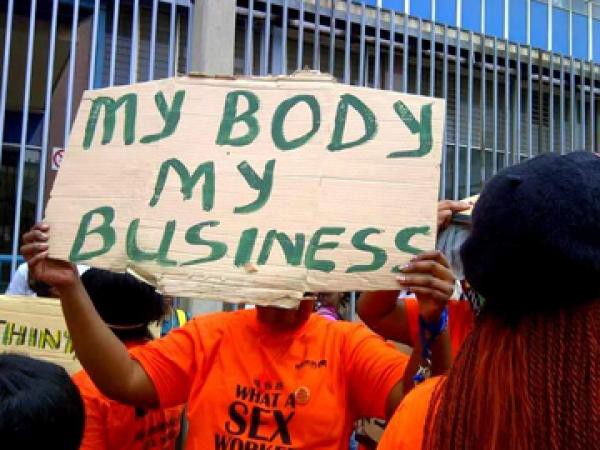Elections 2024: What the major political parties say about sex work
We sent questions to the ANC, DA, EFF, IFP, FF Plus, ActionSA, PA, MK Party and RISE Mzansi
For over two decades, activists have been campaigning for the decriminalisation of sex work. We decided to ask the major political parties what they think. Photo courtesy of Sonke Gender Justice
Today’s question to the major political parties deals with sex work.
We asked the ANC, DA, EFF, IFP, FF Plus, ActionSA, PA, MK Party, and RISE Mzansi on 13 March and sent follow-up queries to those who did not respond. Some have still not responded.
Answers are very lightly edited for grammar and typos.
What is your party’s position on the decriminalisation of sex work for:
- Sex workers?
- The clients of sex workers?
ANC: The ANC did not respond to our questions
DA: The DA will decriminalise sex work. The full decriminalisation of sex work refers to the decriminalisation of workers and businesses selling sexual services and clients purchasing sexual services. This differs from the Swedish model as the model decriminalises sex work; however, the purchasing of sexual services remains illegal.
The legal implication would, therefore, apply only to the clients of sex workers. The problem with this model is that it impedes sex workers’ right to economic activity.
Furthermore, the DA will expunge criminal records related to sex work.
In order to address the concerns of consent and human trafficking, the DA proposes the establishment of a Sex Worker Licensing Authority. The Sex Worker Licensing Authority would be responsible for
- licensing of sex worker brothels;
- establishing brothel licensing eligibility criteria;
- establishment of Sex Work Norms and Standards, which would include compulsory health safety and standards; and
- compliance monitoring and inspections of registered businesses in the profession.
Despite the decriminalisation of sex work, street prostitution and unlicensed brothels would remain illegal.
EFF: The EFF recognises sex work as valid work and strongly supports the decriminalisation of sex work for both sex workers and their clients. We believe that decriminalisation will remove sex work from the shadows, allowing sex workers to report crimes and access help from law enforcement without fear of arrest. Through decriminalisation sex workers will also be more likely to seek medical care without fear of prosecution.
As a worker’s party we are also of the firm belief that decriminalisation allows sex workers to organise, negotiate safer working conditions, and advocate for their rights.
Essentially, the EFF believes decriminalisation is a crucial step towards protecting sex workers’ rights, improving public health, and dismantling a system that exploits and marginalises them.
IFP: While not supporting sex work as a form of formal employment, the IFP believes that everyone has a right to safety, dignity and healthcare. The heightened risks faced by sex workers of violence, exploitation and sexually transmitted infections must be mitigated by dismantling the barriers to health care and legal services. Sex workers must be able to report crimes with the expectation of fair treatment from the police. This will require education programmes, and focussing on the universality of human rights as enshrined in our Constitution.
FF Plus: The FF Plus said they were against the decriminalisation of sex work, whether for sex workers or their clients.
ActionSA: Sex workers: ActionSA will decriminalise and regulate the provision of sex work.
The clients of sex workers: ActionSA will maintain the illegality of solicitation.
PA: We accept the abundant evidence that criminalising sex workers only makes these individuals (mostly women) even more vulnerable to abuse and rape, including from police officers themselves. Sex work should be regulated, taxed and made safer, since currently the industry is highly prevalent but is controlled by criminal syndicates. Ironically, this makes it more vulnerable to human trafficking, which is what the criminalisation was ostensibly meant to combat. A curious point about all this is that the legal clauses on sex work are all that remain of the apartheid-era Immorality Act. We would be better off getting rid of that set of laws completely.
The clients of sex workers? There is no point to these laws, as long as what is happening is genuinely consensual.
MK Party: The MK Party did not respond to our questions.
RISE Mzansi: RISE Mzansi supports the legalisation of sex work based on our constitutional and political values of freedom and protecting the human rights and respecting the dignity of all people. Criminalising sex work inevitably leads to sex workers being less able to avoid contracting and more likely to transmit HIV/AIDS, not enjoying the protection of the law when assaulted and victimised. It deepens societal stigma against them, and makes them vulnerable to exploitation, assault, rape and even murder.
It also violates their right to have full freedom and autonomy over their bodies. We therefore believe sex work should be legalised and regulated, with emphasis placed on reducing the harms associated with sex work in partnership with the industry, rather than criminalising sex workers.
RISE Mzansi would continue to criminalise and prosecute any form of human trafficking and sexual exploitation.
Next: Fierce winds send Khayelitsha shacks flying
Previous: Beneficiaries struggling with grants since SASSA closed Macassar office
© 2024 GroundUp. This article is licensed under a Creative Commons Attribution-NoDerivatives 4.0 International License.
You may republish this article, so long as you credit the authors and GroundUp, and do not change the text. Please include a link back to the original article.
We put an invisible pixel in the article so that we can count traffic to republishers. All analytics tools are solely on our servers. We do not give our logs to any third party. Logs are deleted after two weeks. We do not use any IP address identifying information except to count regional traffic. We are solely interested in counting hits, not tracking users. If you republish, please do not delete the invisible pixel.



